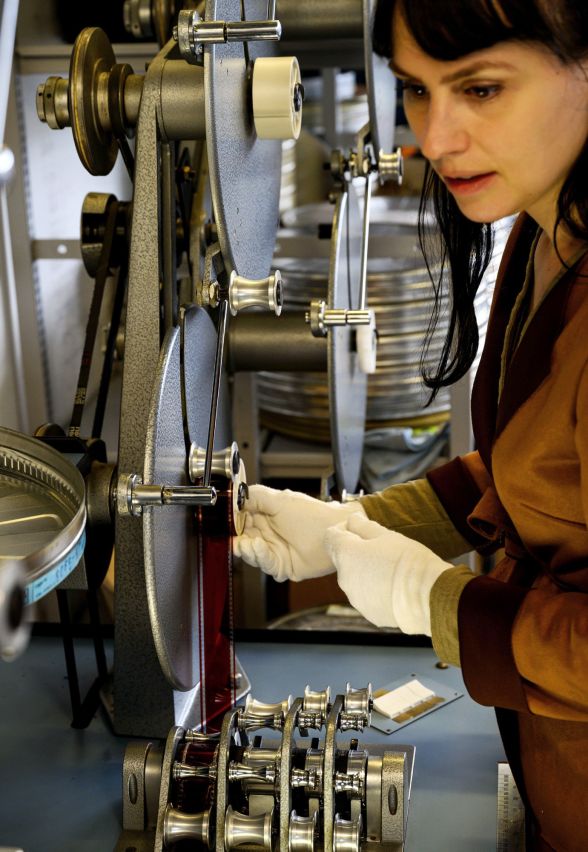
›Nie wieder schlafen‹, G 1992, directed by: Pia Frankenberg
© Deutsche Kinemathek / Pia Frankenberg Musik- und Filmproduktion
Film Archive
General information
The film archive (including viewings) will reopen on 2 May, 2025. Requests can be processed as usual from that date on, but occasional delays may take place due to our relocation. We appreciate your understanding and look forward to hearing from you.
-
Contact us
-
Search portal
Search now (in German only)An overview of our holdings can be found through our search portal.
The archive for independent film
The Deutsche Kinemathek preserves audiovisual material for nearly 80,000 film titles. More than 22,000 of them are available from our film distribution service. Our curated collection covers all periods, formats, and genres of film. Above all, it is distinguished by works created outside the economic, aesthetic, and social mainstream of their time. It includes films made by independent production companies, as well as bold artistic perspectives that questioned existing norms or broke new ground.
The special areas of the collection are: feature and documentary films from the Weimar Republic to the present day with socio-critical perspectives, films by female filmmakers, transcultural cinema, works by queer filmmakers, experimental films, New German Cinema and the Berlin School, and formats such as home movies and advertising films. The Deutsche Kinemathek is also the archive for the German Film and Television Academy (DFFB) and many of its graduates. As the theatrical distributor of DEFA films, we not only provide a range of perspectives on the city of Berlin but also on cinema from both East and West Germany.
More information

© Deutsche Kinemathek / Marian Stefanowski
The film archive in action
Film preservation is not a passive task; it involves a great deal of activity. We collect films, review them, and make inventories. We research and record all the information available in our database. We repair, restore and ensure the best possible storage conditions. And our collection continues to grow.
Accessibility is an essential aspect of our archive, with an emphasis on a wide range of different forms of access and on dialogue with the public. Film distribution is therefore a crucial part of our archive. In addition, we offer an on-site viewing service, organize events at which films are discussed or used for educational purposes, and screen them online or offline in public programs. We work closely with researchers, artists, curators, and film-program makers, and collaborate with festivals and initiatives on a local and international level. We’re here for anyone interested in film. In our archive, film never stops moving. Do not hesitate to contact us — we look forward to hearing from you!
News
Information on restoration work in the film archive

© Deutsche Kinemathek / Marian Stefanowski
Digital restoration
The Deutsche Kinemathek regularly carries out digital restorations, particularly as part of the Film Heritage (FFE) funding program. By doing this, we digitally preserve films for the long-term and ensure that they can be watched again. Our focus is on material acutely threatened with decomposition and works that represent the special areas of our collection and distribution. When selecting films, we take different perspectives into account and seek exchange: Which films are no longer available or only partially accessible? Which films are in demand from cinemas, festivals, and initiatives? Which films in our extensive collection do researchers, curators, and various communities draw our attention to?
The most sought-after restorations we have been able to implement so far through the FFE program include the Weimar workers’ film “Kuhle Wampe” (Slatan Dudow, 1932) and two award-winning films by female filmmakers: Pia Frankenberg’s “Brennende Betten” (1988) and Helke Sanders’ “Die allseitig reduzierte Persönlichkeit – Redupers” (1977).
